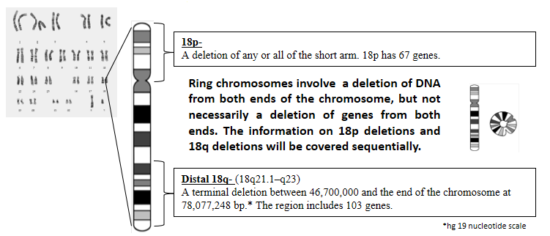What is Ring 18: A Sixty-Second Summary
ICD-10 = Q99.9 or Q93.89

Key points on genotype
- Molecular and cytogenetic evaluations are both necessary to make a Ring 18 diagnosis.
- Every patient has unique deletions from BOTH ends of the chromosome; thus Ring 18 is not a single “syndrome.” (For guidance developing an individualized gene-based interpretation see subsequent pages.)
- Some patients have deletions that do not include the deletion of any genes from one of the chromosome arms.
- Therefore, the clinical implication information is separated into 18q (Distal 18q-) and 18p (18p-) in the following pages.
- Some genotype-phenotype correlations have been established and are explored more in the following pages.
- ~20% have duplications just proximal to the breakpoint of up to 30 Mb in size
- Ring 18 occurs in 1 out of 300,000 live births
Key Points on phenotype
- Multiple congenital anomalies are possible. Specific phenotypes are dependent on the specific genes deleted – see the section of this report on molecular implications.
- Developmental delay is always present
- Intellectual disability is common but not inevitable
- Failure to thrive and growth hormone deficiency are common
- The risk for autism spectrum is higher than average
- Life expectancy is believed to be near normal except for individuals with very large duplications in addition to the deletions.
Management
- Affected individuals are not at increased risk for adverse reactions to drugs or standard medical treatments
- Treatment is primarily symptomatic
- Recommendations for specific evaluations and treatments are in the following sections
Enrollment
- The Chromosome 18 Clinical Research Center is enrolling anyone with any chromosome 18 abnormality in our longitudinal study of all aspects of the conditions.
- Parents need to contact Annice Hill at hilla3@uthscsa.edu or call (210) 567-5321
- We need the diagnostic genetics report and any other informative medical records
- Then we will schedule a blood draw and shipment
Consultation
- Daniel Hale, MD, Medical Director of the Chromosome 18 Clinical Research Center can be reached through Annice Hill at hilla3@uthscsa.edu or call (210) 567-5321.
Updated 2020

